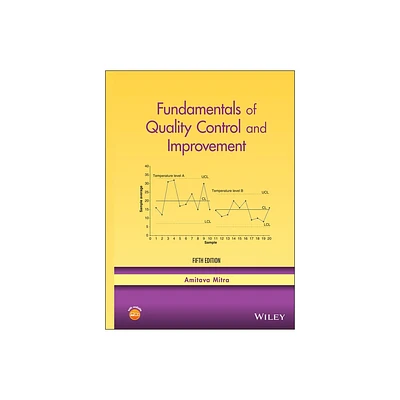Home
Fundamentals of Quality Control and Improvement
Loading Inventory...
Barnes and Noble
Fundamentals of Quality Control and Improvement
Current price: $160.95


Barnes and Noble
Fundamentals of Quality Control and Improvement
Current price: $160.95
Loading Inventory...
Size: Hardcover
*Product Information may vary - to confirm product availability, pricing, and additional information please contact Barnes and Noble
The newest edition of an insightful and practical statistical approach to quality control and management
In the newly revised and thoroughly updated Fifth Edition of
Fundamentals of Quality Control and Improvement
, accomplished academic, consultant, and author Dr. Amitava Mitra delivers a comprehensive and quantitative approach to quality management techniques. The book demonstrates how to integrate statistical concepts with quality assurance methods, incorporating modern ideas, strategies, and philosophies of quality management.
You’ll discover experimental design concepts and the use of the Taguchi method to incorporate customer needs, improve lead time, and reduce costs. The new edition also includes brand-new case studies at the end of several chapters, references to the statistical software Minitab 19, and chapter updates that add discussions of trending and exciting topics in quality control.
The book includes access to supplementary material for instructors consisting of a new instructor’s solutions manual and PowerPoint slides, as well as access to data sets for all readers.
Readers will also benefit from the inclusion of:
A thorough introduction to the evolution of quality and definitions of quality, quality control, quality assurance, quality circles, and quality improvement teams
An exploration of customer needs and market share, as well as the benefits of quality control and the total quality system
Practical discussions of quality and reliability, quality improvement, product and service costing, and quality costs
A concise treatment of how to measure quality costs, the management of quality, and the interrelationship between quality and productivity
Perfect for upper-level undergraduate and graduate students in quality control and improvement, the Fifth Edition of
will also earn a place in the libraries of business students and those undertaking training programs in Six Sigma.
In the newly revised and thoroughly updated Fifth Edition of
Fundamentals of Quality Control and Improvement
, accomplished academic, consultant, and author Dr. Amitava Mitra delivers a comprehensive and quantitative approach to quality management techniques. The book demonstrates how to integrate statistical concepts with quality assurance methods, incorporating modern ideas, strategies, and philosophies of quality management.
You’ll discover experimental design concepts and the use of the Taguchi method to incorporate customer needs, improve lead time, and reduce costs. The new edition also includes brand-new case studies at the end of several chapters, references to the statistical software Minitab 19, and chapter updates that add discussions of trending and exciting topics in quality control.
The book includes access to supplementary material for instructors consisting of a new instructor’s solutions manual and PowerPoint slides, as well as access to data sets for all readers.
Readers will also benefit from the inclusion of:
A thorough introduction to the evolution of quality and definitions of quality, quality control, quality assurance, quality circles, and quality improvement teams
An exploration of customer needs and market share, as well as the benefits of quality control and the total quality system
Practical discussions of quality and reliability, quality improvement, product and service costing, and quality costs
A concise treatment of how to measure quality costs, the management of quality, and the interrelationship between quality and productivity
Perfect for upper-level undergraduate and graduate students in quality control and improvement, the Fifth Edition of
will also earn a place in the libraries of business students and those undertaking training programs in Six Sigma.


















